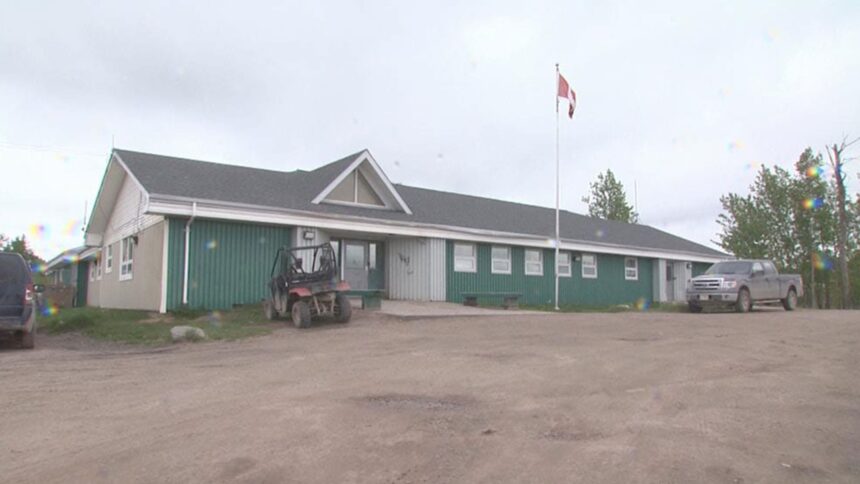Pikangikum First Nation is seeking $200 million from Canada in Federal Court as an interim measure to help it repair and maintain its water, sewage and fire service systems. It’s part of what is now a two-pronged legal battle to improve infrastructure in the community located in northwestern Ontario. In a statement released Thursday, leadership alleged that it was forced to make the moves after receiving “no response” from the federal government on the issues facing the community. “Nothing changes. Canada makes repeated promises for improvements that never come,” Chief Paddy Peters said in the statement. “Meanwhile, the health of our people is at risk every day. “They live in conditions that would shock most Canadians, and we are told to keep studying the problem.” Peters said the fly-in Anishinaabe community, about 230 kilometres north of Kenora, Ont., is seeking “emergency relief” from the government. The two sides have yet to agree on a hearing date for the $200 million motion before the courts. This action is part of a larger lawsuit that was filed by the community last year. According to an amended claim filed in February 2025, the community wants the court to order “Canada to pay damages in the amount of $2 billion, or such sum as the Court deems appropriate, for its Breaches,” and, “an order compelling Canada to pay special damages in an amount to be determined.” The community alleges Canada is in breach of its “fiduciary, constitutionally-mandated, statutory, contractual, treaty, and common law duties” by failing to give Pikangikum access to “potable water, and sewage disposal, and fire prevention.” The claim said the community has been under “multiple long- and short-term drinking water advisories in recent years, including from October 2000 to July 2002, and again from October 2005 to September 2018. The most recent boil-water advisory in Pikangikum was issued on February 8, 2024.” The situation has made people ill, the claim noted. “Members of the community have contracted, and continue to contract, skin diseases and parasites due to lack of access to potable water and inadequate sanitation,” it alleges. “Others have sustained injuries and death just from the daily chore of travelling long distances through unsafe areas, often in sub-zero temperatures, to access outdoor toilet facilities or haul water from one of the distribution points.” The claim also seeks $100 million in punitive damages. It said Pikangikum has an estimated population of 4,150. Because “many children are not registered under the Indian Act” the population is “grossly underreported by Canada,” it stated. The Treaty 5 community wants Canada to “immediately construct, or approve and fund the construction and repair of, appropriate water and sewage systems, and fire prevention infrastructure on an emergency basis, with such construction and funding overseen by the Court or a Court-appointed administrator or officer.” Peters said the community has declared a state of emergency due to the “critical state of water and wastewater infrastructure,” and has had no choice but to impose daily water conservation measures” to keep community institutions like the school operating. The community said it hasn’t received a response from Indigenous Services Canada (ISC). ISC, in response to questions from APTN News, said the community is welcome to go to court. “The Government of Canada respects the choice of First Nations, including Pikangikum First Nation, to seek the Court’s assistance on the important issue of safe drinking water,” said department spokesperson Carolane Gratton in an email. When APTN questioned why ISC hadn’t been responding to Pikangikum’s concerns, it did not receive a reply. In a follow up email, ISC said that from 2015 to 2025, Canada has spent $10.1 million on “operations and maintenance (including salaries for operators, chemicals, replacement parts, heating, fuel and electricity etc.) of the water and wastewater facilities; purchase of two sewer trucks and one water truck and supports for professional services related to water and wastewater operations,” according to spokesperson Eric Head. Pikangikum claims its infrastructure issues have been studied for two decades. “These studies have all confirmed what has been known for years: Pikangikum’s existing infrastructure is woefully inadequate to meet its current and projected needs, including for consumption, sanitation, and firefighting,” the statement said. “The existing wastewater infrastructure in the community routinely fails, contaminating the community’s lake and its treated water reservoir.” The claim said a technical assessment completed in February 2025 recommended a series of “urgent repairs and upgrades just to preserve the status quo.” Pikangikum’s request for immediate federal assistance to complete those repairs remains unanswered, it added. “When we met with Canada in February this year, I implored ISC to provide real long-term solutions rather than temporary fixes, but even the temporary fixes they won’t address,” Peters said in a statement. Editor’s Note: Information supplied by Indigenous Services Canada was added after the story was published. Continue Reading
Pikangikum First Nation seeking interim help ahead of $2B lawsuit for safe drinking water

Leave a Comment









